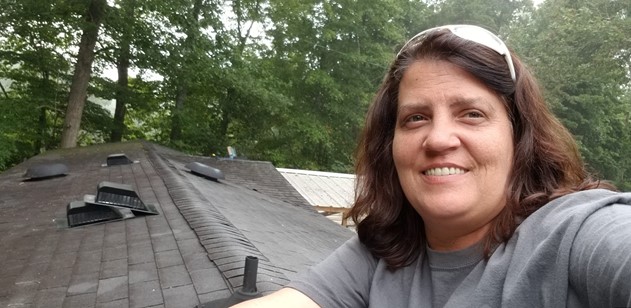The Weatherization Assistance Program (WAP) has been around for nearly 45 years and has served more than 8 million households, saving families money, and making their homes healthier and safer. From the very beginning, women have been a driving force for improving service and increasing access in the WAP. This post is part of a series to highlight the contributions of women to the WAP, their stories of getting involved in the program, and why their passion drew them to it. You can join the conversation by posting your own story on social media with the hashtag #WomenOfWAP.

Jo McAninch – Technical Analyst at North Carolina Department of Environmental Quality
From crew member, to auditor, to QCI, to state technical analyst, Jo McAninch has worn every hat in the weatherization network. From 2006 to today, Jo’s career in weatherization has been defined by growth and learning. With a strong commitment to service and giving back, she has touched the lives of clients in all her different positions. Over the last 15 years in weatherization, Jo has never doubted that she is exactly where she is supposed to be.
Jo, affable and skilled in interacting with new people, ran a convenience store in 2005. A connection through her son’s cub scout troop sent her information on an opening at a local Community Action Agency (CAA). When she showed up to learn about the position, the CAA’s WAP Director said, “I have the perfect job for her!” Jo started as the only woman on a 15-person weatherization crew. “I got bit by the bug,” Jo said, “I didn’t want to do anything else. That experience was probably the best of my life.” After a year and a half on the crew, Jo’s supervisor told her “I took a gamble on you, and it paid off.”
Being on a crew taught Jo everything about weatherization from the bottom up. “You learn how it works and why you’re doing it,” she said. After a year and a half on the crew, Jo’s CAA needed help auditing. “I learned how to do it,” she said, “and being on a crew first was so instrumental in being able to perform audits.” A woman energy auditor was a rare sight at the time, and Jo decided to use her middle name for appointments so customers wouldn’t realize she was a woman until she showed up. “They may have been surprised at first,” she said, “but once we met and talked over the job ahead, they became comfortable with my knowledge and being a woman was no longer noticed.” Jo got her QCI certification and started doing final inspections on homes. After 5 years gaining experience as a QCI, Jo was at a meeting for her CAA with someone from the North Carolina Department of Environmental Quality. “I want to do what he does,” she said. After an opening appeared on the State’s staff, that is exactly what Jo did.
Jo attributes her success in so many areas of weatherization to training, despite her stress with certifications. “I am not a test taker,” she said. “I get test anxiety and the whole nine yards. The first time I took my QCI I failed it.” Jo returned the next day and passed the test for her QCI certification.
Having trainings paid for allowed Jo to learn and keep growing as an auditor. “I couldn’t afford college,” Jo said. “I was the first person at the State who came there straight from an agency”. Jo is proud of the work that she does.
Jo highlighted the importance of accessible trainings in retaining a weatherization workforce. “Unfortunately, we lose good weatherization workers,” she said. “Especially older ones, they don’t care to go to a class to sit for 2 weeks knowing they won’t pass the test.” Jo says she’ll do whatever she can to learn, but some people aren’t able to do it or don’t think they can succeed. Jo suggests targeting high schools to get women and young people into WAP. “Some people aren’t made for college or can’t afford it,” she said. “But they do want a career.”
To Jo, the weatherization network is like a brotherhood and sisterhood. “Once you are in WAP, you are part of a big family.” On a trip from Virginia, Jo got a flat tire near Henderson. “I knew an agency there and called someone who worked there,” she said. “Five minutes later they were there plugging my tire.” Jo also emphasized her connection to clients. “It’s more than energy efficiency, we change people’s lives.” At inspections, Jo would give people her card in case anything came up. “I would get calls at 9 pm when people got their first new electric bill,” she said. “They’d tell me its down $40 and now they could pay another bill they didn’t think they’d be able to.”
Jo says she gets to give back every single day. Shrinking carbon footprints and helping clients is a win-win situation according to her. “I’ve been in homes where one spouse has died and the resident is alone now,” she said. “To sit down and take the extra time to explain everything, really showed them they have someone who genuinely cares. They understand they have an advocate in me.” According to Jo, this is what makes her excited to get up every day and go to work in WAP.





